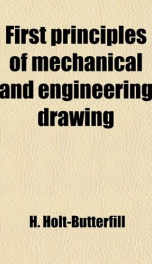first principles of mechanical and engineering drawing

Purchase of this book includes free trial access to www.million-books.com where you can read more than a million books for free. This is an OCR edition with typos. Excerpt from book: CHAPTER II MECHANICAL AND FREEHAND DRAWING : THEIR DIFFERENCE AND USES 8. Before proceeding with an exposition of the principles on which the practice of mechanical drawing is based, it is necessary that the studentwho is assumed to have no previous knowledge of the subject should thoroughly understand the radical difference, in character and application, which exists between it and that kind of drawing known as " freehand." The generic term " drawing," strictly speaking, is the art of representing objects on a surfacegenerally flatby means of lines showing their forms and general contour, independent of colour or shading; for the latter, without form, would be meaningless and incapable of expressing anything. Freehand drawing is the practice of the art of drawing by means of the hand, the eye alone controlling and guiding the tool or instrument used for delineation. The hand guided by the eye can, however, only picture or draw what is seen from one position at a time ; for were it otherwise, a distorted view of the object would be the result, as its appearance to the eye from one point of view would be different to that from any other. All objects are made visible to the sense of seeing by the agency of light, whether natural or artificial, for without light it would be impossible to distinguish one object from another. To the artist or draughtsman, light is a stream of matter given off by a luminous body, travelling from its source in thin straight linesor raysto the object illumined, from which it is reflected or transmitted in the same way to his eye. What is seen, or is apparent to his sense of sight, he depicts or draws on his paper. If he changes his position with respect to the illumined object, he sees it differently, and obtains a different view of it; ...
Info about the book
Author:
Series:
Unknown
ASIN:
B000M7ALNM
Rating:
3.5/5 (4)Your rating:
0/5
Languge:
English
Users who have this book
Users who want this book
What readers are saying
What do you think? Write your own comment on this book!
write a commentif you like first principles of mechanical and engineering drawing try:
Other books by this author
Do you want to read a book that interests you? It’s EASY!
Create an account and send a request for reading to other users on the Webpage of the book!

